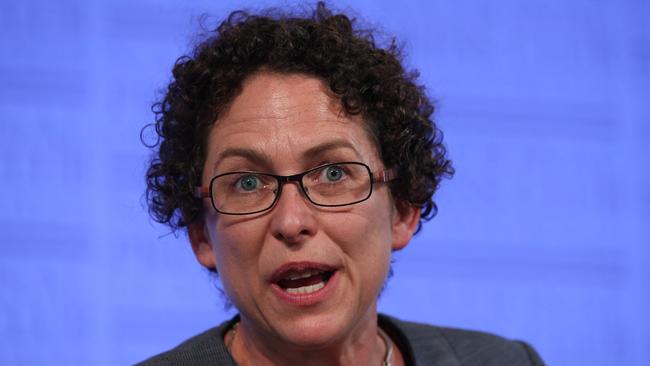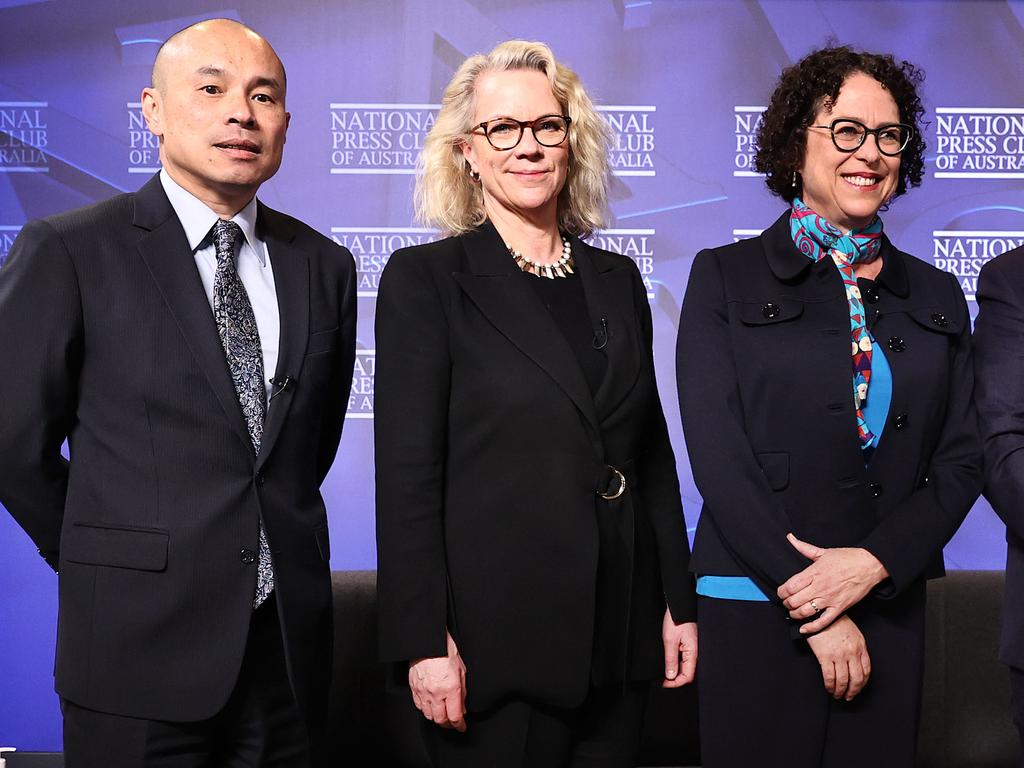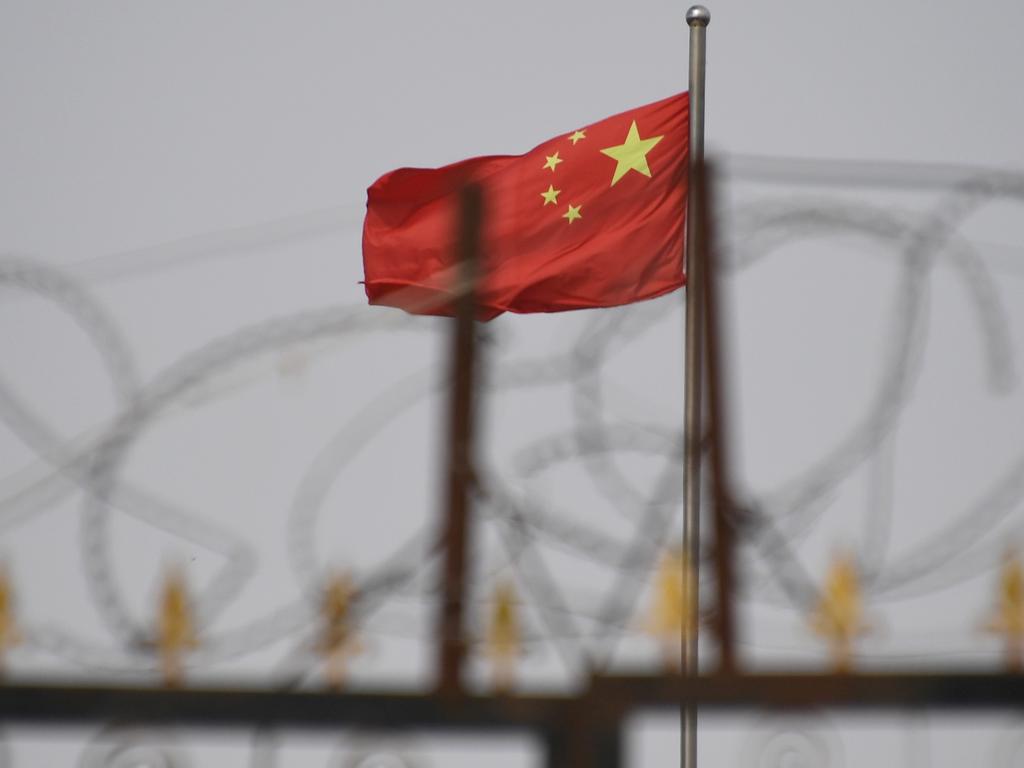Academic Jane Golley feels persecuted over China comments
A prominent ANU China acaedmic has been hammered by online abuse after she publicly cited an ‘anonymous article’ that cast doubt over grave human rights abuses.

The director of ANU’s taxpayer-funded Centre on China in the World says she feels “persecuted and misinterpreted” after she publicly cited an “anonymous article” that cast doubt over grave human rights abuses towards Uighur Muslims in Xinjiang.
An emotional Jane Golley told The Australian on Monday she had been “hammered” by a torrent of online abuse after she told the National Press Club last week she had read a “convincing” but anonymous paper contradicting media reports of China’s widespread mistreatment of Uighurs.
The academic paper, obtained by The Australian, downplays female sterilisation in Xinjiang, questions whether the practice could be considered “family planning” and diminishes claims regarding genocide and the incarceration of one million Uighurs as being “unsupported.”
It also says forced sterilisation in Xinjiang is occurring but isn’t specifically designed for Uighurs or “intended to stop them having any children.”
“ … authorities are finally implementing family planning policies in Xinjiang, thereby limiting family size, an interpretation which is supported by the public statement in 2017 that Xinjiang would implement a ‘uniform family planning policy for all ethnic groups,” the article says.
Professor Golley told The Australian she was extremely concerned her comments may have offended Uighur Muslims and she had no doubt they were suffering at hands of an “increasingly repressive Chinese government.”
However, she said she found some of the academic paper’s arguments, including its disagreement with the number of Uighurs detained in labour camps “convincing” – “or at least plausible enough to warrant further consideration”.
“This does not mean I think the number of Uighurs suffering is insignificant,” she said.
The anonymous report also claims that “political re-education’’ and ‘‘deradicalisation’’ programs in Xinjiang are plausible, but says “vocational training has probably been offered to a greater number of people than political re-education.” It calls on the West to apply a more “normal critical discussion” to the issue.
“With China now such an emotive topic for many in the West, the chances of a more rational and objective discussion of Xinjiang look slim,” it said. “But the authors hope that this paper may at least encourage the resumption of normal critical discussion about this most important of topics.”
Professor Golley, an economist, conceded she was not an expert on Xinjiang, so could not make a judgment on the report’s veracity.
She told the National Press Club last week she had read the “convincing” but anonymous paper contradicting media reports of China’s widespread mistreatment of Uighurs.
“Just last week I received a scholarly article that debunks much of what you have read in the Western media on this topic, including the figure of one million Uighurs in detention camps, the pervasive use of forced labour, and of calling it genocide,” she said.
“The authors sent it anonymously because they fear the reaction here in Australia by those who are committed to the dominant narrative.”
China’s deputy ambassador to Australia Wang Xining told the same National Press Club address China was “a positive force in the world”, declaring China wanted “every ethnic group to live a good life.”
Cyber security analyst and co-founder of Internet 2.0 Robert Potter said the treatment of Uighur Muslims “absolutely qualifies as genocide.”
“I think it’s absolutely bizarre for the head of the centre for China in the world and Australia’s premier institution to endorse an article that has yet to be published and is intended to be published anonymously,” he told Sky News on Sunday.
Liberal Senator James Paterson, who chairs the Joint Intelligence and Security Committee, told Sky News on Monday he was very surprised Professor Golley had referred to the “anonymous article” during her press club address.
He said the report was clearly “not up to academic standards” and had raised questions of credibility.
“They (the report’s authors) suggest that the forced sterilisation of a Uighur woman might be part of a family planning policy, which is just beyond belief,” he said.
Professor Golley told The Australian on Monday she didn’t mean to say what she had said and should have used a word such as “challenged” rather than “debunked”.
“I wish I hadn’t raised it (the anonymous article) at all now obviously, now I see how big the backlash is,” she said.
She also said she was concerned that anyone who spoke out against the “dominant” media narrative on China is “quickly crushed” and some scholars felt unable to put their name to research that expressed ideas such as genocide not being “the most accurate term” for what is happening in Xinjiang.
“I don’t claim any certainty about the facts that might obtain in Xinjiang,” she said. “But I think we need to be able to discuss them openly, without being subject to personal abuse. That’s what free speech and academic freedom are all about.”
China strongly denies human rights abuses against Uighurs, arguing that facilities branded detention camps in the West are in fact vocational training centres.







To join the conversation, please log in. Don't have an account? Register
Join the conversation, you are commenting as Logout